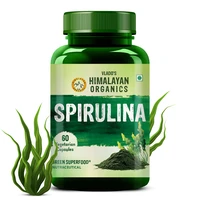Spirulina
Upto 41% OFF

Vlado's Himalayan Organics Spirulina 2000mg
From
₹409
MRP: ₹699
Add
What is Spirulina?
Spirulina is blue-green algae found worldwide in fresh and marine water. It gained popularity after NASA used Spirulina as a dietary supplement for space astronauts.
Spirulina has an impressive nutrient profile and potent antioxidant properties. It is easy to digest and can conveniently be a part of a regular diet.
Spirulina: Benefits & Uses
Here are a few science-backed health benefits of Spirulina.
- Nutrient-dense: Spirulina is naturally rich in nutrients like protein, iron, vitamin A, vitamin B12, phenolic acids, copper, tocopherols and gamma-linolenic acid.
- Antioxidant-rich: Free radicals are associated with an increased risk of various disorders like diabetes, cancer, and chronic inflammation. Spirulina contains a compound called phycocyanin with powerful antioxidant properties to fight free radicals and oxidative stress.
- Protein-rich: Spirulina has a high protein content. It is rich in essential amino acids and can be taken by people who avoid dairy to meet their daily protein needs.
- Boost athletic performance: Spirulina's high protein and antioxidant content makes it suitable for people with an active lifestyle. It helps meet daily protein needs and supports a speedy recovery by reducing oxidative stress and improving endurance.
- Improves lipid profile: Studies suggest Spirulina may have cholesterol-lowering properties and boost HDL cholesterol levels. Therefore, it may be suitable as a dietary supplement to treat hyperlipidaemia.
- Anti-inflammatory: Spirulina intake may help reduce the levels of inflammatory markers and provide relief from pain, swelling and redness.
- May help fight anaemia: Spirulina supplements may benefit people suffering from anaemia. Its high iron content may help boost haemoglobin levels and reduce deficiency symptoms.
- Healthy blood sugar levels: Studies indicate that Spirulina positively affects blood glucose levels and reduces insulin resistance.
- Better immune health: Spirulina's antioxidant and anti-inflammatory properties makes it superb for our immune health.
- May reduce cancer risk: Evidence support that Spirulina intake may lower cancer risk and reduce the growth of tumour cells when taken regularly.
How does Spirulina work?
The exceptional nutritional value of Spirulina and its high antioxidant is primarily responsible for all the health benefits. It is high in protein, vitamin E, vitamin B12, omega-3 fats, and beta-carotene.
How to choose the right Spirulina for you?
Here are a few points to consider before buying Spirulina.
- Spirulina supplements are widely available in various forms like powder, liquid, capsule, and tablets. One can choose based on preference and convenience to consume.
- Check the recommended dosage and serving size on the pack. Avoid exceeding the dosage. If you are unsure of your requirement, consult an expert.
- Spirulina supplements may contain harmful toxins, heavy metals or contaminants. Preferably opt for an organic Spirulina, which is lab-tested and certified.
- Prefer buying a reputable brand from a trusted source like Nutrabay.
- People allergic or sensitive to any food must read the allergen warning on the pack before finalizing any supplement.
- People with medical conditions must consult their doctor before taking spirulina capsules.
How to use Spirulina?
- One can take Spirulina capsules or tablets with juice or water.
- Spirulina powder can be added to shakes, smoothies, or juices. It can also be added to soups, stews or dishes to enhance their nutritional value.
Where to buy Spirulina?
Nutrabay.com is India's most trusted leading online website for the best Spirulina capsules and tablets. Products sold on Nutrabay are 100% authentic as they are sourced either directly from the brands or official importers. We guarantee a hassle-free buying experience online with secure payment options. Check out Nutrabay for the best Spirulina price to feel great every day and build a perfectly healthy body.
Is Spirulina safe to use?
Spirulina is generally considered safe to use when taken within the recommendation. However, some people may experience minor symptoms like nausea, headache, and insomnia. People on regular medications should take Spirulina tablets only after consulting their doctor.
Frequently Asked Questions (FAQs)
1. What is the correct dosage of Spirulina?
Currently, there are no Spirulina dosage recommendations by ICMR, but studies suggest that it may vary between 1-10 grams daily depending on the health goal.
2. Are there any Spirulina side effects?
Spirulina is considered safe to consume but may cause mild side effects like stomach upset, nausea or insomnia. People allergic to it may experience allergic reactions like skin rashes, swelling or difficulty breathing.
3. What is the best time to take Spirulina?
One can take Spirulina at any time of the day.




